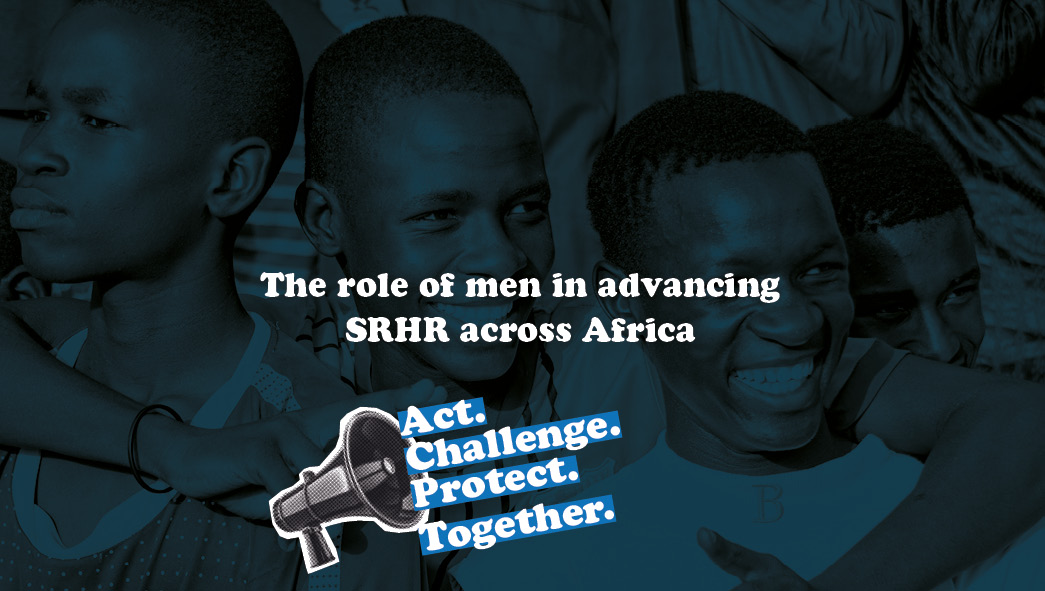The role of men in advancing SRHR across Africa – Act. Challenge. Protect — Together.
Sexual and reproductive health and rights (SRHR) affects everyone. But too often, SRHR is only seen as something for women. That’s not right.
Men also need SRHR services – from accurate information to respectful healthcare. Whether it’s HIV prevention, mental health, family planning, access to disability-responsive health services, or gender-based violence support – SRHR matters for every BODY.
And men have the power to help change things. By challenging harmful norms, supporting equality, and protecting rights, men can help create a world where everyone can make their own choices and get the care they need. This is for every BODY.
It’s time to act – together!
Why SRHR matters
Across Africa, men often make decisions in families, schools, religious spaces, workspaces, and government. That power can block people from accessing care — or it can help break barriers.
– Men as SRHR beneficiaries: Men need SRHR services too. But harmful gender norms and the feminisation of health mean that services are often not designed with men in mind. This leaves many men without access to the information, support, or care they need – from HIV and STI prevention to mental health and contraception. This must change.
– Men as partners in health: Men are partners in relationships, parenting, and community life. When men care about SRHR, families and communities are healthier.
– Men challenging harm: Men can speak up about harmful ideas – like saying only women should care about birth control, or that men shouldn’t talk about feelings.
– Men supporting rights: When men support SRHR, they help make sure everyone can get care and live without fear or shame.

Myths that hurt — and why we must change them
Some common myths:
- “Only women need SRHR.”
- “Men don’t talk about emotions.”
- “Family planning is only for women.”
- “You can see if someone has an STI.”
- “People with disabilities shouldn’t have children.”
- “Homosexuality is un-African.”
These are ALL not true. And they stop people from getting the help they need. They can also lead to more HIV, STIs, unwanted pregnancies, and violence. Learn more about comment myths and the truths to break them.
MenEngage Africa works to break these myths by:
- Providing men and boys with information to make informed decisions and choices relating to their SRHR.
- Helping communities talk about healthy relationships.
- Working with leaders to change laws and make services better for everyone.

What can men do?
Here are five things every man can do today:
- Learn and share
Find correct SRHR info and talk about it with friends, family, or your community.
- Support others
Help partners, friends, or family make choices about their own bodies. Listen and care.
- Seek SRHR
Men need SRHR services too. Seeking out SRHR services is one powerful way men can take charge of their health, challenge harmful norms, and support a culture of care and equality.
- Speak out
Don’t laugh at harmful jokes. Don’t stay silent when someone is treated badly.
- Take part
Join a local meeting, school talk, or group working for gender justice.
Voices from the movement
1. Rev. Cliff Nyekanyeka – Malawi
“I’ve seen women struggling; I’ve seen them suffering and I feel for them. I am pro-choice because I’ve seen what it means [not to be], and I think I have to contribute to the movement.”
— Rev. Cliff Nyekanyeka, Religious Leaders Network for Choice, Malawi (Source)
2. Dr. Denis Mukwege – Democratic Republic of Congo
“My hope is that women are not waiting for their freedom to be given by men. Women are realizing that nobody gives them a gift; they have to take it.”
— Dr. Denis Mukwege, Nobel Peace Laureate and founder of Panzi Hospital (Source)
3. Stephen Chukwumah – Nigeria
“Sexual rights are human rights. We cannot talk about development without addressing the health and dignity of all people, including sexual minorities.”
— Stephen Chukwumah, Executive Director, Improved Youth Health Initiative, Nigeria
4. Patrick Nsama – Zambia
“Every man, woman & child must look within themselves and find the courage to do the unimaginable to effect change for the African continent.”
— Patrick Nsama, Councilor for Chainda Ward, Lusaka, Zambia Source
Insights from MenEngage Africa
- Expanding reach: MenEngage Africa operates in 24 countries, collaborating with over 600+ organisations to promote gender equality and SRHR.
- Resource development: Creating toolkits and training for boys, teachers, leaders, and families.
- Community impact: Helping boys and men see new ways to be strong, caring, and fair.
For more information and access to these resources, visit the MenEngage Africa Resources Page.
Men are not the problem — but they must be part of the solution.
When men support SRHR, everyone benefits.
Let’s Act. Let’s Challenge. Let’s Protect.
Because SRHR is for every BODY.

